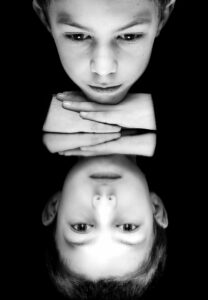Your Relationship With Yourself & Your Love Life

Most people don’t consider the fact that they have a relationship with themselves. This oversight is very costly psychologically, because the relationship we have with ourselves forms the unconscious foundation of just about everything else in our psychological and interpersonal lives. To say the least, the relationship you have with yourself is well worth bringing to consciousness, in case you have to work on it in order to improve your emotional and relationship life. Let’s analyze it a bit and see what we find.
By the way, this most intimate of relationships has a periperal presence in our language. I’m sure you’ve heard the phrase, “I was beside myself yesterday.” How about, “I took myself out last night and had a good time.” Or, “I was mad at myself for making that phone call.” All examples of the duplicity that implies a self, relating or reacting to itself. Taking this a step further, it is entirely possible, and the previous phrases suggest it, to be at odds with oneself. The implied internal conflict would be a problem for any mind trying to work in any integrated way. An example of the extreme negative form of this conflicted internal relation would be the experience of self-hatred or self-loathing common in clinical depression.
How this unconscious relationship you have with yourself affects your love life experience is of particular interest. It makes perfect sense that how I feel about myself will have an influence on how I feel about another actual person. Let’s take a straighhtforward example for illustration. If I have been taught to be unaccepting of myself because of years of rejection in the family I grew up in, I will most probably be replicating that rejection in how I relate to myself. This is a very common occurrence, namely, treating yourself the way you were treated. Might I expect the person I love to be rejecting as well? Another variation would be, rejecting the person I fall in love with because that’s how I’ve learned to treat myself. Either one would undoubtedly be problemtaic in a love life.
Fixing the relationship we have with ourselves can be a much needed psychological project in adulthood. As a clinical psychologist and psychoanalyst interested in analyzing this unconscious relationship, I have become sensitive to the various ways people treat themselves. You can hear it in the language that is used to refer to oneself. You can also see it in the things people do and don’t do in their lives. And you can definitely feel it in the way a person expresses how they feel about themselves.
The first step is always bringing the relationship to oneself to consciousness. When you have someone’s attention in this regard, it’s useful to provide examples. Generally speaking, I find patients to be quite receptive to this kind of “insight” or looking inward. They are often speechless when the observations are shared, as if the importance of the phenomenon is finally being recognized. People often will react like they are grateful that someone has finally shared the observation that they treat themselves badly. Forms of self-abuse and self-neglect are unfortunately quite common.
Now that an awareness has formed, practicing the labelling and limitation of what is unhealthy can take place. The final step is to practice doing something healthier. In this case, treating oneself with care and respect and unlearning the earlier negative lessons that unhealthy relationship experiences have taught us about ourselves. Patients will often be motivated to do this “mind cleansing” work if they are convinced of the fact that it will substantially improve their love lives. For example, taking better care of oneself, practicing forms of compassion directed to oneself, and developing an ability to forgive oneself, are obvious indisputable benefits that will substantially improve a person’s ability to give love and receive love.
Comments welcome. Share your love life experiences.
Dr. Thomas Jordan, clinical psychologist, interpersonal psychoanalyst, author of Learn to Love: Guide to Healing Your Disappointing Love Life. Contact: 212-875-0154 or drtomjordan@lovelifelearningcenter.com for inquiries. Love Life Telehealth Consultations available by request.
